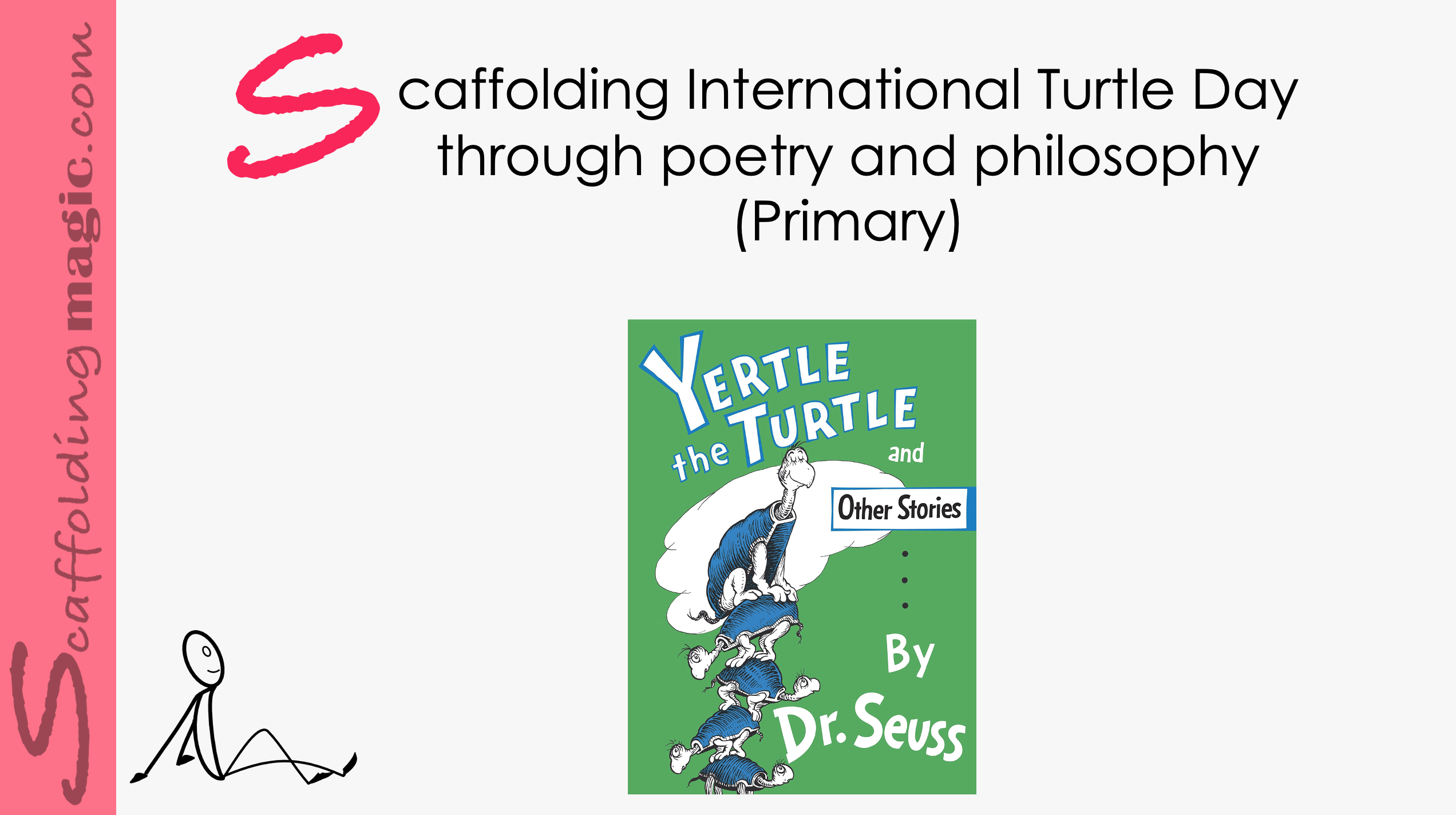- a children’s book writer…
- a poet…
$5.00
Seriously? A children’s book about turtles is philosophical? Oh yes it is! Theodor Seuss Geisel (Dr. Seuss), was not just a writer of children’s books, but a profound philosopher, a poet, a political advocate (sometimes controversial), and a promoter of critical thinking on all levels.
Scaffolds that offer opportunities for verbal interactions compensate for this lack. They help students to strengthen, build and diversify language as well as to use skills they might not develop by themselves.
Scaffolds that offer opportunities for verbal interactions compensate for this lack. They help students to strengthen, build and diversify language as well as to use skills they might not develop by themselves.
Higher-order level questions – those that elicit deeper thinking – help students to stretch their thinking and engage their curiosity, their reasoning ability, their creativity, and independence. These questions encourage students to open their minds, they offer opportunities to produce original thinking. A well-structured question sparks perspectives that might not have at first occurred to us; they encourage us to look at the issue from different perspectives. Higher-order level questions inspire fresh and sometimes even startling insights and ideas, they open roads for wider perspectives of the issue, and enable teachers and students to work together in constructing understanding. If we use effective questioning skills in the educational environment, we help our students to be more effective thinkers now and in the future.*
Higher-order level questions – those that elicit deeper thinking – help students to stretch their thinking and engage their curiosity, their reasoning ability, their creativity, and independence. These questions encourage students to open their minds, they offer opportunities to produce original thinking. A well-structured question sparks perspectives that might not have at first occurred to us; they encourage us to look at the issue from different perspectives. Higher-order level questions inspire fresh and sometimes even startling insights and ideas, they open roads for wider perspectives of the issue, and enable teachers and students to work together in constructing understanding. If we use effective questioning skills in the educational environment, we help our students to be more effective thinkers now and in the future.*
This scaffold helps students to become personally involved in whatever text they are asked to read. The technique includes using verbal reasoning to aid in the reading of new material – so that the reader has the opportunity to build a mental representation of the text through critical thinking and deliberation. The active dialogue while reading helps students to maintain active nodes (that might otherwise be passive), and the construct of knowledge then becomes stronger and can be accessed longer.
This scaffold helps students to become personally involved in whatever text they are asked to read. The technique includes using verbal reasoning to aid in the reading of new material – so that the reader has the opportunity to build a mental representation of the text through critical thinking and deliberation. The active dialogue while reading helps students to maintain active nodes (that might otherwise be passive), and the construct of knowledge then becomes stronger and can be accessed longer.
Writing is one of the four cornerstone skills of every inclusive educational curriculum. It helps us form our thoughts into coherent verses and communicate over distance and time. It is a skill usually approached as a way of appeasing bands for standardised exams, but, in fact, is the perfect tool to foster the development and expression of empathy.
Empathy is a way of connecting with other people in such a way so that you show you understand what they’re experiencing – and that you respect their experience as something meaningful – even though you may not understand exactly how it feels for them. In other words, empathy is about finding a way to connect.
Writing is one of the four cornerstone skills of every inclusive educational curriculum. It helps us form our thoughts into coherent verses and communicate over distance and time. It is a skill usually approached as a way of appeasing bands for standardised exams, but, in fact, is the perfect tool to foster the development and expression of empathy.
Empathy is a way of connecting with other people in such a way so that you show you understand what they’re experiencing – and that you respect their experience as something meaningful – even though you may not understand exactly how it feels for them. In other words, empathy is about finding a way to connect.
